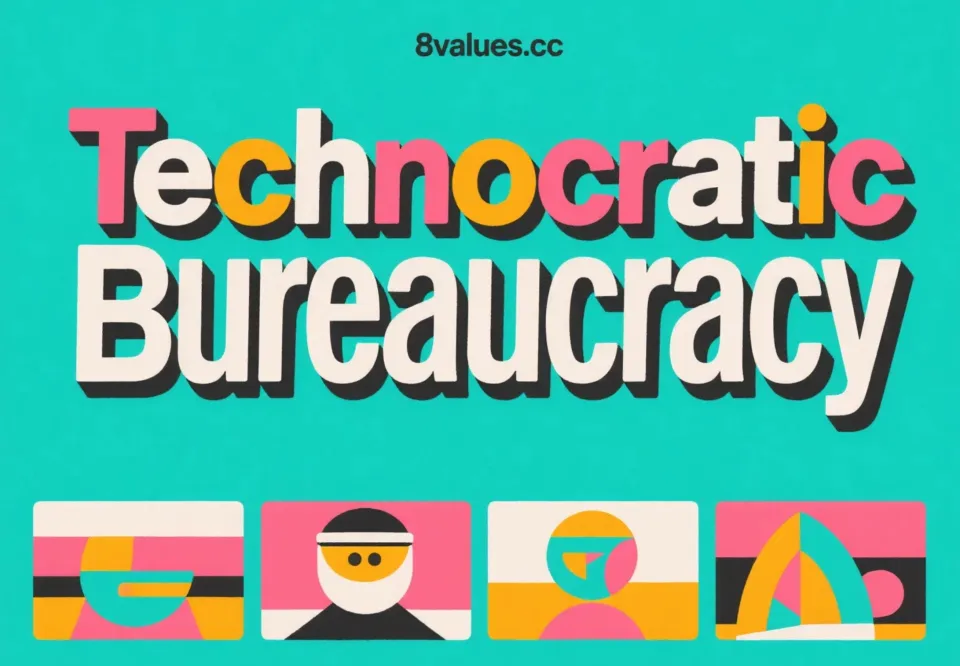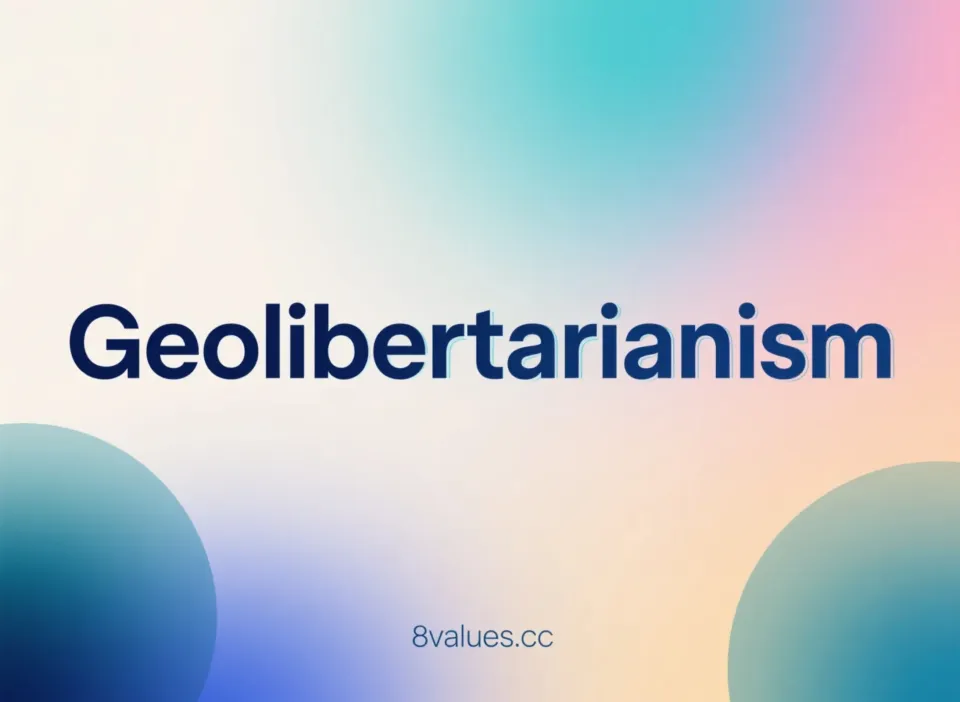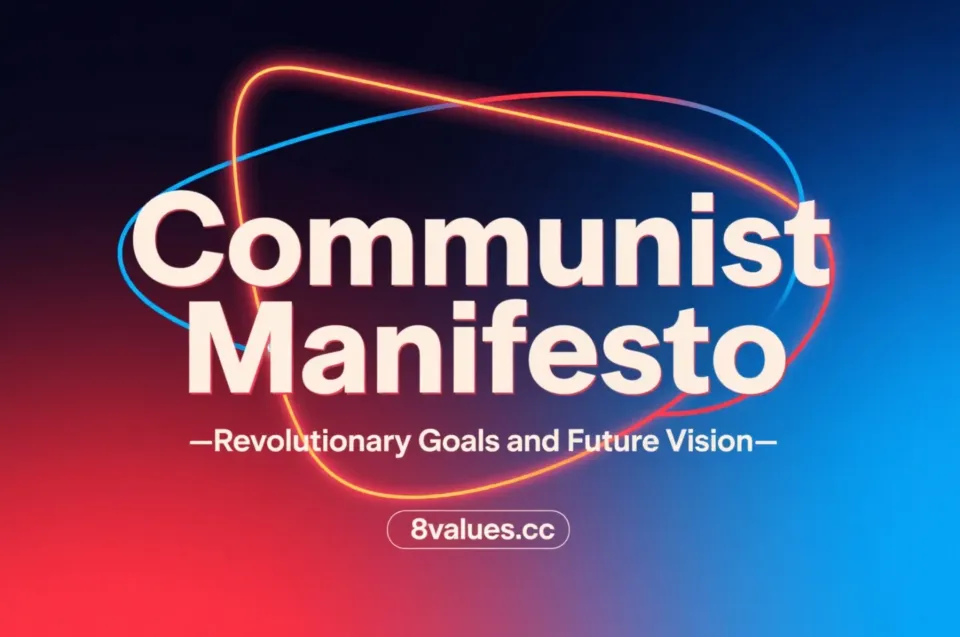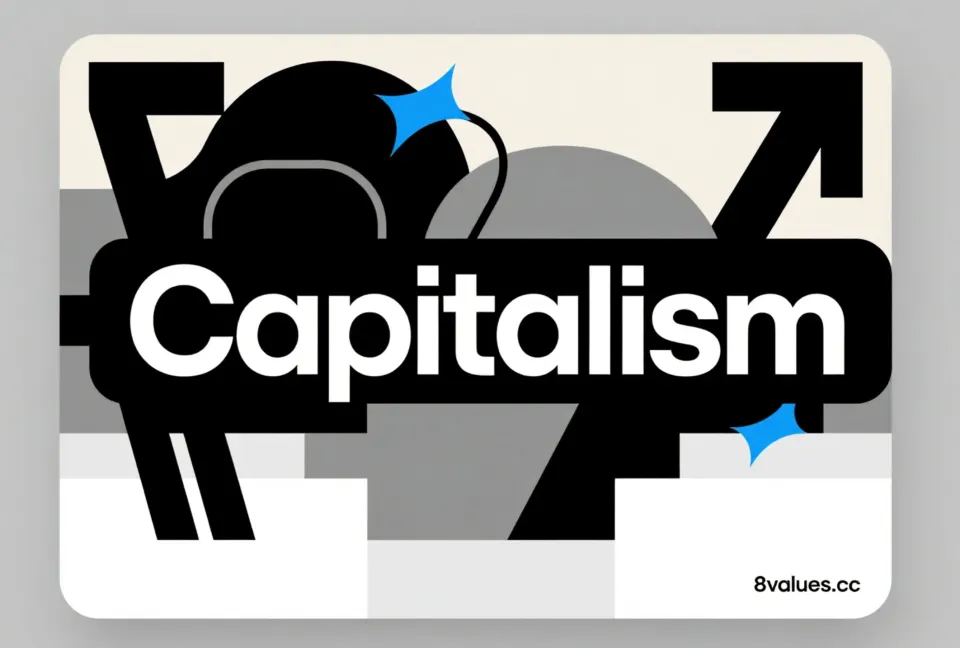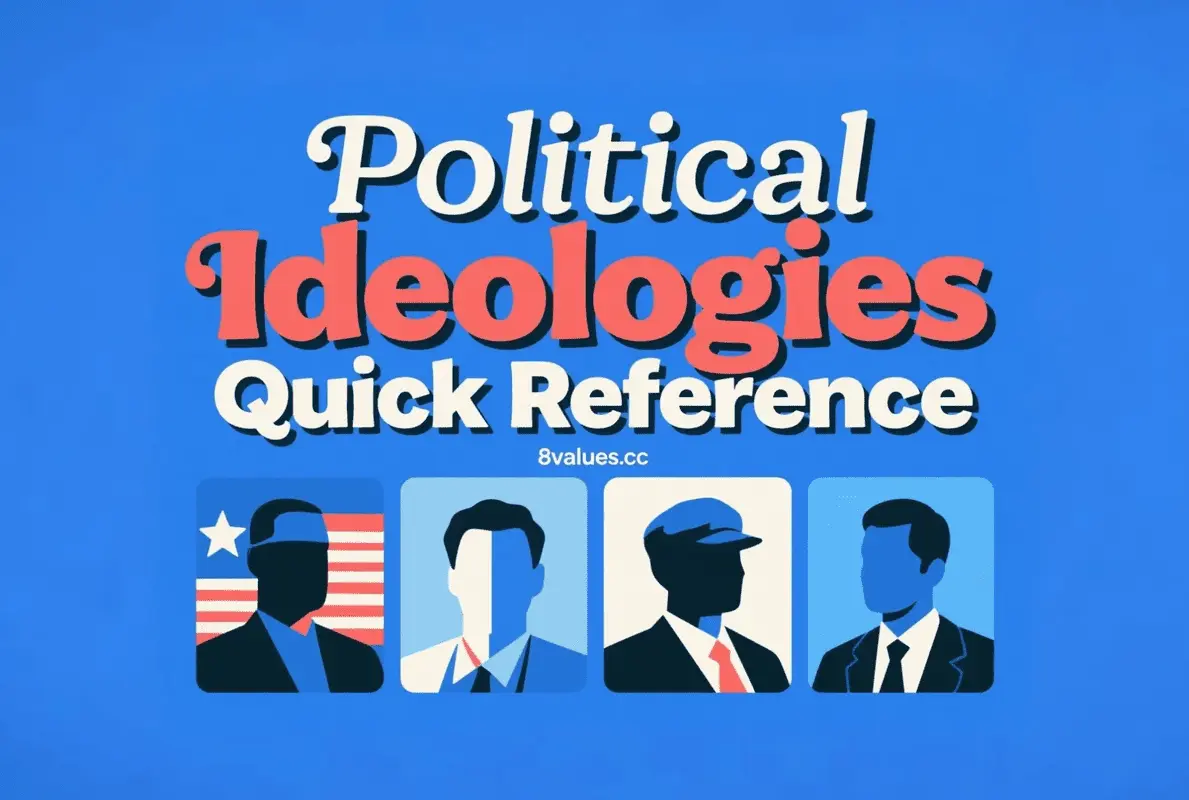Технократическое бюро | 8 Обзор интерпретации идеологической идеологии политических тестов
Исследуйте технократическую идеологию в испытании политической ориентации 8. В этой статье анализируется идеологическое происхождение, основные концепции, политические предложения и их преимущества и проблемы в современном социальном управлении, помогая вам полностью понять эту политическую позицию, которая подчеркивает профессиональное управление и научные решения. Участвуйте в идеологическом тесте 8 Values, изучите свои политические склонности или проверьте все идеологические результаты.
Технократическое бюро-это модель управления, в которой подчеркивается власть принятия решений, в которой преобладают технические эксперты (такие как инженеры, ученые, экономисты и т. Д.). Его основной заключается в управлении социальными, экономическими и политическими делами, основанными на «технической рациональности» и «максимизации эффективности». Он выступает за управление социальными и экономическими делами посредством профессиональной бюрократии и научных и технологических средств и считает, что команда специально обученных экспертов будет максимизировать эффективность и справедливость в принятии решений. Эта модель глубоко интегрирует научное управление, профессиональную рациональность и технические средства в процесс управления, стремясь повысить эффективность и точность, но также может вызвать новые проблемы.
Основные концепции и характеристики технократии
Суть технократического бюро - это модель управления, сформированная после того, как техническая рациональность встроена в бюрократическую систему . Основная логика заключается в том, что он выступает за то, чтобы в принятии решений преобладают группы, которые мастер профессиональных знаний и технических возможностей и считают, что «техническая рациональность» (такая как оптимальная эффективность, точные данные и строгая модель)-это оптимальный путь к решению социальных проблем, подчеркивая, что «профессиональная власть» выше, чем «политический авторитет» или «общественный авторитет».
Правило эксперта и специализация для принятия решений.
Технологическая бюрократия выступает за то, чтобы принятие решений возглавляется технократами с опытом, а не избранными представителями или участием общественности. Выбор лиц, принимающих решения, основан на их технической экспертизе и опыте, который отличается от того, как универсальное избирательное право используется в интересах большинства в традиционной демократии. В такой системе политики полагаются на отдельных лиц и учреждения с опытом и данными, а не консультантами с политическим опытом или лояльностью. Технологи - это люди с техническим обучением и карьерой. Они считают, что многие важные социальные проблемы могут быть решены путем применения технологий и связанных с ними методов. Они в основном обусловлены их когнитивными «моделями мышления проблемы с проблемой проблемы».
Тенденция деполитизации и рациональность и объективность
Технологи, как правило, определяют общественные проблемы как чисто технические проблемы, полагая, что существует «оптимальное решение», чтобы избежать идеологических дебатов и конфликтов во множественном числе. Это подразумевает, что управление должно превзойти партизанские и политические различия и преследовать нейтралитет «науки» и «рациональности». Технократы считают, что все проблемы являются техническими проблемами и могут быть решены с помощью технических средств, основанных на типичном технократическом мировоззрении, который предполагает, что мир обладает внутренней логикой и, по сути, является гармоничным.
Приоритет эффективности и стандартизация рабочих механизмов
Эффективность является основной целью технократии. Он подчеркивает «оптимальное решение», «контроль затрат» и «стабильность системы», но иногда может игнорировать социальную справедливость, демократические процедуры и диверсифицированные ценности. Операционный механизм выступает за принятие решений на основе данных, моделей и эмпирических данных, подчеркивает реинжиниринг процесса, количественную оценку эффективности и стандартизированное управление и преследует рациональность и максимальную эффективность инструмента. В эпоху цифровых технологий это проявляется как большое доверие к большим данным, алгоритмам и системам автоматизации.
Интеграция бюрократии и технического органа
Технологическая бюрократия не только использует организационную силу бюрократической системы для достижения внедрения технических решений, но также укрепляет «рациональность» бюрократических решений с помощью технического органа. Он отличается от традиционной бюрократии, которая опирается на межличностные отношения и административные уровни, в то время как технократия уделяет больше внимания профессиональной компетентности и принятию решений, управляемых данными.
Теоретическая основа и историческое происхождение технократии
Идеологическую основу технократии можно проследить до конца 19 -го и начала 20 -го веков. С ускорением индустриализации и модернизации социальное управление все чаще полагается на профессиональные знания и административную эффективность.
Начинание ранней мысли
Задолго до того, как был придуман термин «технологическая бюрократия», были предложены идеи, связанные с управлением техническими специалистами, были предложены людьми из всех слоев общества, самым известным из которых был ранний социалистический теоретик Генри де Сен-Симон. Сент -Саймон предложил заменить аристократическое правление «промышленниками и инженерами» и установить социальное порядок, в котором преобладает «техническая рациональность». Промышленное общество, которое он предполагал, чисто технократической системой, представляло собой систему планирования и рационального порядка, которая прояснила бы его потребности и организует факторы производства для удовлетворения этих потребностей.
Рождение термина «техническое господство»
Слово «технократия» происходит от греческих слов «τέχνη» (Tehhne, означает навык) и «κράτος» (Кратос, означает силу, управление или правило). Калифорнийский инженер Уильям Генри Смит часто считается человеком, который придумал этот термин в 1919 году и использовался для описания «повышения правила людей через ученых и инженеров в качестве агентов своих слуг». Смит первоначально использовал его для промышленной демократии, движения, в котором работники интегрируются в принятие решений через существующие предприятия или революции.
Движение по технологическому доминированию 20 -го века и современное развитие
Во время Великой депрессии 1930 -х годов «движение технического доминирования», представленное Говардом Скоттом и М. Кинг Хаббертом, было ненадолго популярным в Соединенных Штатах. Группа выступает за замену валюты на энергетические сертификаты, и неполитические, рациональные инженеры несут ответственность за руководство экономической деятельностью, достигая термодинамического баланса между производством и потреблением, тем самым устраняя безработицу и долг.
Современная технократия представляет собой кристаллизацию рационалистических идей и действий и является суммой технологических, экономических и социальных революций, которые произошли во всем мире в рамках утилитарного рационализма со времен Коммерческой революции, особенно промышленной революции.
Эффективность технократии в тесте политической ориентации 8 Values
В испытании политической ориентации в 8 обзоров технократия обычно проявляется как сочетание измерений:
| Тестовые размеры | Положительный счет | описывать |
|---|---|---|
| Равенство против рынков | Нейтральная к рынке тенденция | Поддерживать комбинацию упорядоченных рынков и национального регулирования |
| Демократия (авторитет против свободы) | Умеренный авторитаризм | Склонен укреплять бюрократию и техническое управление |
| Общество (традиция против прогресса) | Прогрессивный | Подчеркнуть научный и технологический прогресс и институциональную реформу |
| Дипломатия (нация против глобуса) | Национализм | Обратите внимание на национальные интересы и безопасность |
Эта позиция подчеркивает использование профессиональных технологий и научных решений для повышения эффективности национального управления, сохраняя при этом определенную авторитетную структуру для обеспечения исполнения. Если вы хотите узнать свое собственное выступление на этой должности, пожалуйста, перейдите к политическим координатным координациям. Идеологические тенденции для переоценки.
Основные концепции и политические предложения технократии
Последователи и сторонники технократии выдвинули ряд политических предложений и концепций управления, направленных на достижение социального прогресса через профессионализм и рациональность.
1. Приоритет профессионального управления: укрепление экспертной власти принятия решений
Технологическая бюрократия выступает за то, чтобы профессиональные чиновники и команды экспертов управляют общественными делами, уменьшают политическое вмешательство и принятие популистских решений, а также укрепляют научные и управляемые данными. Они считают, что планирование развития требует высокого уровня экономических и технических знаний, поэтому технические эксперты и бюрократы играют незаменимую роль в процессе разработки.
2. Административная эффективность и стандартизация: создание эффективного правительства
Улучшив законы, правила и административные процессы, гарантируйте правительство эффективно работать и избежать бюрократической коррупции и неэффективности. Эффективность является ключевым критерием бюрократической деятельности, и целью всех действий является повышение эффективности или производительности, достижение экономического развития или увеличение производства на душу населения.
3. Наука, техника и политика, управляемая инновациями: содействие современному управлению
Активно продвигать научные и технологические инновации, применить передовые технологии к управлению экономическим вопросом, социальными услугами, защитой окружающей среды и других областей и достигают современного управления. Темпы технологического развития делают его революционным и могут вызвать глубокие экономические и социальные изменения, которые технократия приветствует, потому что она может повысить эффективность и внедрить новые технологии.
4. Ограничение политического экстремизма: преследование стабильности и постепенной реформы
Технологическая бюрократия противостоит перепадам и беспорядкам, вызванным идеологической борьбой, подчеркивая стабильность и постепенную реформу. Они считают, что споры об идеологии - это пустая трата времени, потому что как левой, так и правой идеологии не хватает научных и технологических оснований. По их мнению, управление больше не является политической проблемой, а технической проблемой, которая требует рационального и точного анализа экономических и социальных проблем и использования существующей технической экспертизы для принятия решений.
Глобальная практика случаев технологического бюро
Технологи имеют много форм практики во всем мире, от успешных национальных моделей развития до сложных задач по передаче политики, до «технического расширения прав и возможностей и« технического отчуждения »в корпоративных операциях.
Технологи в национальном развитии и управлении
- Успешный опыт Ботсваны : модель развития Ботсваны рассматривается как «чудо в Африке», которое в значительной степени объясняется его эффективным и автономным технократическим управлением. Страна строго реализует систему отбора элиты при наборе государственных служащих и обращает внимание на квалификацию и опыт. После обретения независимости Ботсвана не жертвовала эффективностью, чтобы локализовать государственных служащих, таких как большинство африканских стран, но решили постепенно заменить иностранных экспертов, чтобы обеспечить профессионализм и компетенцию государственных услуг. Министерство финансов и планирования развития (MFDP) играет центральную роль в развитии Ботсваны, которая и ее ключевые позиции уже давно руководили опытными технократами.
- «Технологическая бюрократическая власть» Европейского союза (ЕС) : законодательная структура ЕС описывается как «технологическая бюрократическая власть», а Европейская комиссия имеет «законодательную монополию» в законодательном процессе ЕС. С 1990-х годов было много «технократических правительств» с не избранными экспертами (то есть технократической бюрократией), занимающей важные должности в европейских парламентских демократиях, таких как Италия. Например, экономист Марио Монти когда-то возглавлял кабинет не избранных специалистов.
- «Технологическая бюрократическая модель» Сингапура : некоторые люди считают, что Сингапур является лучшим примером технократии, а политические и экспертные компоненты ее государственной системы, кажется, полностью интегрированы.
- Историческая технократическая практика : бывшие советские лидеры часто имели техническое образование, а в 1986 году 89% членов Политбюро были инженерами. В историческом развитии некоторых стран лидерство также имело инженерную и практическую науку.
Проблемы разработки политики и транснациональной политики
- Наблюдение за онлайн -посредническими услугами в Южной Корее : Комиссия по справедливой торговле Кореи предложила в 2020 году законопроект о регулировании услуг онлайн -посредника, и ее ключевые идеи опираются на регулирующие рамки ЕС. Тем не менее, исследование показало, что переводы политики могут показаться удобными на поверхности, но на практике очень сложны, поскольку каждая юрисдикция имеет уникальную среду как в коммерческих, так и в регулирующих аспектах. Правительство Южной Кореи не смогло полностью рассмотреть конкретную ситуацию своей страны при ускорении законодательного процесса, что привело к неоднозначности законопроекта обременять коммерческий сектор.
- Бюрократическая неэффективность и коррупция в Нигерии : в отличие от Ботсваны, государственные службы в Нигерии уже давно сталкиваются с проблемами коррупции, неэффективности и неадекватных возможностей. Его бюрократия не имеет эффективности в разработке и реализации политики. Система набора неэлитов, механизм продвижения старшинства и злоупотребление принципами «федеральных характеристик» и «системы квот» привели к недостаточным возможностям персонала государственной службы. Кроме того, технократическая нестабильность владения и политические вмешательства серьезно препятствовали когерентности и эффективной реализации политики.
Управление технологиями в сочетании технологий и капитала
- Задача «технологического бизнеса-буро» : в повседневной жизни абсурд и бессилия технократии иногда могут быть удивительными. Например, опыт неудачи автоматической платежной системы, многоуровневой передачи обслуживания клиентов и дополнительной платы за одноразовую оплату «одноразовый», все это отражает неудобства и беспомощность, которые могут быть вызваны сочетанием технологий и бюрократии. Эта «технологическая бизнес-болеяка» у людей, которым не хватает времени или ресурсов, может привести к неспособности нести дополнительные расходы или пропустить важные сроки, в конечном итоге с более серьезными последствиями.
- Рост алгоритмического управления : под капитализмом платформы алгоритмы становятся «невидимыми технократами», которые определяют информационную циркуляцию, распределение ресурсов и социальное поведение, и пользователи обычно не имеют права участвовать в нормотворчестве.
Проблемы и критика технологического бюро
Хотя технократия имеет потенциал в повышении эффективности и решении сложных проблем, ее неотъемлемые характеристики также вызвали многие противоречия и проблемы.
1. Отсутствие демократической легитимности и экспертного самодержавия
Чрезмерная зависимость от экспертов может игнорировать волю народа, что приведет к отсутствию широко распространенного признания управления, что, в свою очередь, создает «демократический дефицит». Технические процессы принятия решений часто являются непрозрачными и трудными для общественности понимать и участвовать, и технические эксперты могут не нести непосредственную ответственность перед общественностью. Это делает технократию формой правления меньшинства. Критики утверждают, что технократия повышает мнения и мнения технологов до благородного статуса, в то же время маргинализируя мнения и мнения простых людей.
2. Экспертная концентрация власти и монополия знаний
Власть на принятие решений сосредоточена на бюрократах, которые освоит технологии, и заинтересованные стороны в широкой общественности или нетехнических областях исключены из процесса принятия решений из-за отсутствия «технической дискурсной власти». Это может легко сформировать монополию на «технические элиты», отвергать разные голоса и усугубить разрыв между элитами и общественностью. Технологи монополизируют дискурсную силу «рационального» и «науки» и принижают другие формы знаний (такие как местные знания и этические суждения).
3. бюрократическая жесткость и формализм
Чрезмерная стандарта может ослабить инновации и гибкость. Чрезмерное стремление к техническим показателям и соблюдение процессов может привести к средствам, отклоняющимся от их цели. Например, для проведения цифровых оценок, таких как «онлайн -ставка» и «скорость клика», он игнорирует фактический эффект обслуживания людей, что приводит к «интеллектуальной бюрократии». Этот «цифровой формализм» проявляется в цифровой трансформации местных органов власти как сосредоточенности на строительстве и пренебрежении эксплуатацией и обслуживанием, что приводит к «зомбизациям» большого количества цифровых платформ.
4. Технический детерминизм риск и рациональная усадка ценности
Чрезмерная зависимость от технологий для решения всех проблем может игнорировать социальную сложность и гуманистические факторы. Технологическая бюрократия высоко защищает инструментальную рациональность (как эффективно достичь целей), но часто игнорирует рациональность ценности (являются ли сами цели законными и в соответствии с человеческой природой). Это может исключить не поддающиеся количеству измерений, таких как этика, эмоции, справедливость и справедливость, что приводит к дегуманизации государственной политики.
5. "Технологические бюрократические дивиденды" и социальное неравенство
Критики предложили концепцию «технократического разрыва», ссылаясь на «разрыв в эффективности» между институтами управления, которые принимают технократические принципы, и общественностью, которые хотят участвовать в принятии правительственных решений. Элиты, контролирующие технологии и данные, могут формировать новые центры власти, усугубляя цифровой разрыв, оставляя группы без технического доступа или знаний дальше от процесса управления.
Баланс между технократией и демократией
Существует сложная напряженность и синергия между технократией и демократией. Уолдо считает, что рациональность, эффективность и технические возможности бюрократии могут поддерживать демократию, такие как обеспечение реализации политики посредством научного управления, но существует конфликт в ориентации на стоимость двух: бюрократия подчеркивает иерархические правила и профессиональную власть, в то время как демократия фокусируется на равном участии и гражданских правах.
Чтобы обуздать негативные последствия технократии, нам необходимо использовать многосторонний подход для содействия технологической демократизации, укрепления институциональных ограничений и этических норм, а также сбалансировать взаимосвязь между «технологией» и «управлением». Идеальная современная система управления должна осуществлять баланс между «инструментальной рациональностью» и «рациональностью ценности», обеспечивает хорошее использование сильных сторон технологий и придерживаться человеческой субъективности и демократических ценностей, чтобы технология могла действительно служить людям, а не заставлять людей сдаться технологии.
Резюме: обоюдоострый меч, который сосуществует с эффективностью и риском
Технологическая бюрократия является неизбежным продуктом двойных тенденций «технической» и «бюрократизации» в современном обществе. Это похоже на обоюдоострый меч, предоставляющий набор методов для повышения эффективности управления с помощью профессиональных знаний и рациональных инструментов, но если его неотъемлемые антидемократические и обесцененные тенденции не эффективно не проверены и сбалансированы, это может привести к более утонченной и скрытой бюрократической форме и даже развивается в «техническую автократность».
Основным противоречием является не «технология» или сама «бюрократическая система», а дисбаланс между «технической рациональностью» и «социальной ценностью» в процессе объединения их. Только принимая «общественные интересы» в качестве якоря, ограничивая техническую власть через институты, уравновешивая элиту с демократией и направляя техническое направление с помощью этики, может вернуться технократии к сути «обслуживания средств к существованию людей» и реализовать «управление с поддержкой технологий», а не «управление технологиями».
Какими бы ни были ваши политические убеждения, понимание этих сложных идеологий имеет важное значение для нашего понимания того, как работает общество. Если вы заинтересованы в технократии или других политических позициях, посетите восемь ценностей политического теста, чтобы изучить больше или ознакомиться с всеми идеологическими результатами для сравнительного анализа. Кроме того, следуйте нашему официальному блогу для более глубоких обсуждений и последних пониманий политических и философских тем.
